Premium Only Content

Freedom Highway - Down Liberty Road (1956 Patriot / Pro America Film)
Freedom Highway - Down Liberty Road (Part 1)
This is a Film produced in 1956.
Down Liberty Road is an American short film directed by Harold D. Schuster. The film is also known as Freedom Highway in the United States. It has an early performance by Tommy Kirk.
A Greyhound bus transports us through the landscape of American mythology. Directed by Harold Schuster. Director of Photography: Jerry Fairbanks. Screenplay: Charles L. Tedford, Leo S. Rosencrans. Film Editor: Milton Kleinberg. Art Director: Theobold Holsopple. Production Supervisor: John McKennon. Musical Supervision: Edward Paul. Assistant Director: Robert Scrivner. With Marshall Thompson (Mysterious Stranger); Tommy Kirk (Jimmy Rollins); Morris Ankrum (Fred Schroder); Angie Dickinson (Mary); Charles Maxwell (Bill Roberts) and Tex Ritter as himself. Winner of the Freedoms Foundation Special Award.
Shotlist
Travelogues set landscapes in motion, and Freedom Highway exploits the roadside panorama as an excuse to celebrate American mythologies. Hanging in the sky as if they were ghosts, patriots, warriors and the myths they exemplify -- the frontier, national independence and manifest destiny -- come to life at key points along the transcontinental route.
Although Americans are widely considered to be a practical, well-grounded people with their eyes on the future, Freedom Highway shows a nation in need of spiritual and patriotic renewal, and this renewal is to be sought in our past. The bus -- the most democratic means of transportation, a great equalizer between people, is the perfect vehicle for the freedom highway, a big metal box on wheels in which the faithless ride and rediscover their lost belief. The busbound journey through space will become a journey through time as great moments and personalities in U.S. history are recreated.
Throughout this century, but especially during the Cold War era, the American landscape has been dominated by visions of past struggles and victories. A look at the familiar images in the supplement, all drawn from vintage road maps, testifies to the familiarity of these visions but also to their more disturbing nature. Most of these images, and most of the images in Freedom Highway, celebrate European exploration, settlement and territorial expansion together with Manifest Destiny, their theoretical inspiration. The Boy Scout, explorer of state parks, vacant lots and fragments of suburban forest, becomes the wide-eyed observer of this mix of present and past. Some souls might be disturbed by this one-sided mythology, like those of Native Americans or those that died to make this expansion possible, but Freedom Highway venerates the past with pride.
"Push 'em through!" shouts a Civil War-era officer leading a wagon train through Native American land, and an intense battle begins where later Greyhound buses will roll. So begins Freedom Highway. In the United States Magazine and Democratic Review (July 1845), John L. O'Sullivan wrote of "our manifest destiny to overspread the continent allotted by Providence for the free development of our yearly multiplying millions." O'Sullivan was writing about the annexation of Texas, which was admitted as a state that year, and his expression "manifest destiny" would later be invoked in many other contexts, especially by those who, later in the century, sought to annex Cuba. "Freedom," as in Freedom Highway, and manifest destiny are closely linked, and manifest destiny is itself linked to road building, to breaking through, to "fighting for our right of way," in the words of the General Motors film Give Yourself the Green Light (1954). Our national obsession with building highways and personalized individual transportation is embodied in our view of freedom as an open road stretching out into the distance.
This entertaining "story of America," as endless as a cross-country bus ride, places an unusual group of travelers on a long-haul Greyhound bus. Fred Schroder, embittered by the death of his son in Korea, is riding to Washington to accept a posthumous Congressional Medal of Honor on the son's behalf. Jimmy Rollins, the Scout, is heading to Washington for his first Jamboree. Love interest is supplied by Mary (a young Angie Dickinson) and Bill Roberts, a basketball star on the make. Tex Ritter, playing himself, takes a short ride on the bus as it passes through Texas, singing about the Alamo and the "freedom road." Most important of all, a black-suited mysterious stranger appears, as if from nowhere, to transform the outlook of the passengers, who include us, the audience. With all the subtlety and depth of a Reader's Digest article, each passenger will do their bit to squeeze patriotic meaning out of the landscape. And yet there's nothing particularly American in the way this film works; one wants to find the Soviet equivalent, which probably is set on the Trans-Siberian Express.
Ken Smith reports: Bus Stop meets Hopalong Cassidy. The Greyhound people, obviously eager to capitalize on the Pioneer mania that swept middle-class America in the fifties, approved this very entertaining film; "a story of America," the narrator informs us. It equates Manifest Destiny with the freedom to ride a Greyhound Scenicruiser from San Francisco to New York. Or, as one passenger puts it, "skimming over our highways today in air-conditioned comfort, it's hard to realize what those '49ers went through to get here."
"Mary" is taking her last solo vacation before she returns to Manhattan and "Waldo," her betrothed. Complicating matters is "Bill Roberts," an unidentified position-playing star of the Philadelphia Eagles, who falls flatter than a sacked quarterback for the red-haired cutie (future star of Bloody Mama). Mary insists that Waldo has "good prospects" but Bill, wise to what Americans really value, asks her, "Do you have fun together?"
Also on the bus is sour-puss "Fred Schroder," (Morris Ankrum, fresh from his role in Earth Vs. The Flying Saucers) who's on his way to Washington D.C. to pick up a belated Congressional Medal of Honor for his dead son, killed in Korea. We also have our protagonist, young "Jimmy Rollins," who's on his way to Washington for his first Boy Scout Jamboree. Jimmy (played by Tommy Kirk, who later starred as Go-Go the Martian in Pajama Party), explains why he's on the bus by himself: "My dog was sick and I couldn't leave until he got better." Appearing abruptly in the seat next to Jimmy at one point is Tex Ritter, complete with cowboy hat and guitar. "Say...aren't you Tex Ritter?!" Jimmy exclaims, blindly accepting it all. Tex utters a few memorable lines, such as "I like a fellah I could depend on even if I was a dog," and "To me, every mile of America is a magnificent mile. 'Specially when you can see it close up like we're doin'." Then Tex warbles a song about the Alamo which, he informs us, was a battle fought "for God and for freedom" and "to stop the invaders." But we're allowed no time to question Tex's historical accuracy, as he launches into another song, this one the theme of the film:
"Thanks! Thanks! To the heros before me, I'm free as a breeeeeeze
I go wherever I pleeeeeeze; with my song, along freedom road!"
Rounding out the cast of characters on the bus is "The Mysterious Stranger," black-suited Marshall Thompson, a nameless muse (and later star of It! The Terror From Beyond Space) who sits like he has a board down the back of his jacket and whose principle task seems to be to gall grumpy Fred Schroder. At one point, as we're treated to Hollywood stock footage of Indians and settlers killing each other, Marshall reminds Jimmy that American history is "history we can be proud of." "Isn't he a little YOUNG for propaganda?" Fred butts in, sourly. "I never thought of patriotism as having an age limit," Marshall snorts.
None of these people get tired or dirty or sore or grumpy as they ride over 2,500 grueling, pre-interstate highway miles together, having to eat roadside food and sleep in a bus for days on end. And everything winds up just fine: Mary, it turns out, wasn't really engaged (the ring belonged to her mother) and she dumps Waldo for Bill. "In this country," Marshall observes, "a woman has a right to change her mind."
Somehow we end up in Washington with a now-pro-America Fred and the ever-spunky Jimmy, who are waiting at the tomb of the unknown soldier for Marshall to show up. "He looked kind of strange, but nice," Jimmy reflects. "I wonder what he does?" "I don't know Jimmy," Fred replies, whistfully. "But whatever it is, I have a feeling his job is done. And to think -- we never even knew his name."
As Marshall fades into the air among the tombstones of Arlington (and as the Scenicruiser drives past cannons at the Gettysburg battlefield) the narrator reminds us, "We know only that his death marks him with the everlasting glory of an American who died for his country. These dead shall not have died in vain!" No, apparently they died so we could travel cross-country by bus.
[This Picture has received the Freedoms Foundation Special award medals]
[skies horses clouds sky music Native Americans heroic images heroism covered wagons pioneers emigrants Westerns landscapes Westward Expansion manifest destiny resistance soldiers U.S. Cavalry]
"Never seen such a war. Johnny Reb don't get you, the Injuns will." "Gotta get this California gold through or Grant will have our scalps anyway." "Push them through, Sergeant." "Yes sir, Lieutenant." [horse gallops]
[Indians war whoops Native Americans battles offensives resistance gunshots rifles firearms fighting shooting killing deaths wounds gunfire man falls off horse.]
I sing as I wander along on the lonely road, There's a song in [The Greyhound Lines present Freedom Highway in Eastman Color songs main titles graphic design]
my heart as I'm totin' my weary load, Over mountain and [with Marshall Thompson, Angie Dickinson, Charles Maxwell, Morris Ankrum, Tommy Kirk and Tex Ritter.]
desert and valley, With the wind for a compass I see, That I'm on the right road and mine is a light load for me. Thanks, thanks, [Director of Photography - Jerry Fairbanks, Art Director - Theobold Holsopple, Film Editor - Milton Kleinberg - Production Supervisor - John McKennon, Musical Supervision by Edward Paul, Assistant Director - Robert Scrivner.]
to the heroes before me, I'm free as the breeze, I go wherever I please, with my song along Freedom Road. [Screenplay by Charles L. Tedford, Leo S. Rosencrans, Produced by Jerry Fairbanks Productions. Directed by Harold Schuster. roads horses feet Greyhound buses runbys pavement surfaces tires wheels]
Gone are the dark days of the war between the States. Gone too are the rumbling wagon wheels on the old pioneer trails. Today, other wheels are rolling on the superhighways of modern America. [roads California coastlines beaches Greyhound buses]
This is a story of America and some of the people along the way. The people could be you or me or the neighbor next door. That is, all except one. [passengers tourists travelers]
The story begins on a California highway near San Francisco.
Meet Jimmy Rollins of Seattle, on his way to Washington, DC and his first Boy Scout Jamboree. He's getting a king-size thrill out of the ever-changing view of America through these big picture windows. [Tommy Kirk gawking looking scenery sightseeing rubbernecking]
"How's it look to you so far, son?" "It's the greatest." "Take this highway for instance. It follows the coast all the way down to San Diego. And then remember it's the same road the Spaniards followed almost two hundred years ago.
Only they called it El Camino Real - King's Highway. Try and imagine how it looked then." "You mean, the Spaniards on horseback?" "In your own mind's eye, yes."
Fred Schroder of Portland, Oregon also has his place in this story of America. Summoned to the nation's capitol to receive a medal for his only son, Fred Schroder should be a proud man. He isn't. [old men elderly men sadness grief anger reading newspapers Golden Gate Bridge San Francisco Bay]
"Oh boy, look at that." "It's the longest single span bridge in the world. " "Gee Whiz.
Aren't you even gonna look at it?" "Look at what? It's only the Golden Gate Bridge." "Only?" [cynicism enthusiasm]
[San Francisco California cable cars Powell Street California Street Nob Hill]
"Sure doesn't look like the old West."
"Well, maybe not here and now, but they tell me you should've seen it a hundred years ago, San Francisco was the old West then. See that street sign up ahead?" "Sutter Street!" Behind that sign I see Sutter's Mill, the Valley of the Sacramento. The year is 1848. [Market Street]
John Sutter's workmen were digging a new mill race in the river and found gold. Sutter tried hard to keep it quiet, knowing it meant trouble, but it was like fighting a prairie fire with a bucket. People came from everywhere. From way beyond the far Missouri, the Mississippi, and the Monongahela. [gold panning prospecting mining speculation riches wealth water covered wagons horses trails California or Bust]
Even the Rockies couldn't stop the rush for gold. Where there was no road, there was block and tackle, and just plain old willpower. Skimming over our highways today in air-conditioned comfort, it's hard to realize what those forty-niners went through to get here. [mountains greed]
A lot of them didn't make it. But the rest kept coming. It went on and on, until the river of the Sacramento and all the runs and creeks were swarming with men seeking California gold. [burning wagons fires flames rivers cricks]
"Gee, I can almost see it. Boy I wonder what happened to all that gold." "I can tell you what happened to some of it." This man is another figure in our story of America. [hats mysterious strangers]
Perhaps the greatest of them all. Mark him well. In his way, he is to affect the lives of several people. "During the war, between the States both the North and South badly needed that gold. Once General Grant sent a detachment to bring through a wagon train of it. They were massacred by Indians. It's all part of our American History now, Jimmy. History we can be proud of." "How did you know my name was Jimmy?"
"Isn't he a little young for propaganda?" "Well, I never thought of patriotism as having an age limit. Why shouldn't we be proud of our history, Mr. Schroder? Even as late as that of Korea." "What do you mean by that?" [cynicism]
San Francisco terminal. Forty minutes for lunch. "Well, Jimmy, let's see what's on the menu, huh?"
"Bye." "So long, Jimmy. Say hello to the President for me. Where did I pick him up?" [bus drivers disembarking curiosity mysteries]
Bus for Sacramento, Chicago, and the East now boarding at gate seven. All aboard. "Thank you." "Is that your number? Fourteen?" [public address systems PA systems loudspeakers announcements bus terminals ticket punching]
"No, young fellow, that's my safety record. Like you earn a badge in Scouting. That means I've driven for fourteen years and never even dented a fender." "You must be pretty good." "Oh, there're plenty of longer records than that. The men who drive for Greyhound are proud they've made it the safest transportation in the land." "Who's the proprietor around here?" [accidents awards reliability]
"Where to, please?" "Philadelphia. Thank you." "Hi there, General." "Hey, aren't you Bill Roberts of the Philadelphia Eagles?" "Could be." "Excuse me." "He's a professional football player." "Thank you." "Fumble." [Angie Dickinson introductions romance]
"Oh, I'm sorry." "That's all right." "Wrong way Roberts does it again." "Thank you." "Thanks, Coach."
[driving skies clouds landscapes open roads roadscapes highways Greyhound buses]
"Anyway I don't have to be in Philly for a week to sign the contracts, so I thought I'd see the country. I hear it's quite a country." "It is." "You live in New York?" "I work there. I've been home on vacation in San Francisco."
"Me too! What do you know! A couple of natives and we gotta go out of town to meet!" "Funny, isn't it?" "Say, look, it's only a hop from Philadelphia to New York. How about seeing the big town together?"
"Why uh, I'll be pretty busy." "Oh, oh I see." "Guess I was offside, huh?" [engagement rings property fidelity faithfulness distancing etiquette]
"Mind if we have a little talk?" "What about?" "You have a problem, and so have I. I thought we might be able to help each other find the answers." "I know the answer to mine." "Are you sure you didn't look in the back of the wrong book?" [mysteries]
"Hey Bill, look at this." "Excuse me, my public." "Look, there's another one!"
"Route of the Pony Express." "It's all right here in the book." "Riders of the Pony Express. That's right. Sacramento was the western end of it, you know." "And St. Joe Missouri was the eastern end. Here it is, listen: The first telegraph line had been strung as far west as St. Joe, Missouri. [road signs STOP signs historical markers St. Joseph]
From there on, the mail had to be carried by stagecoach. It was 2000 miles from St. Joe to Sacramento. It took weeks and months. And then they didn't always get through. That's when the Pony Express was organized. [wooden wheels]
People said it couldn't be done, but it was. 80 daring young riders, many in their teens, and 500 thoroughbred horses.[transportation infrastructure mail delivery postal service communications flashbacks fantasies visions imagination changing horses relays]
They had stations along the way so a rider could change horses every 30 to 40 miles. These pony riders would start out from St. Joe with a pistol and a prayer book and the Sacramento mail. No matter what the difficulties, the dangers or the obstacles, the riders went through. [gunshot transportation infrastructure mail delivery postal service communications flashbacks fantasies visions imagination changing horses relays]
Boy, was that terrific." "You know, you can almost see those ponies." "I wish I would have been living then."
"How old are you, young man?" "Thirteen, sir." "Thirteen. Ten years ago. He liked the West, too." "Who, Mr. Schroder?" "He was a boy scout. They couldn't wait to get him in uniform either." "Easy, Schroder." "What's with this guy? Don't you like this country, mister?" "No, Bill." [highways bridges cynicism anti-militarism pacifism]
"If you want to fight for it they'll give you a uniform, too." "I put mine away after Korea. Any more questions?" "I think it's time for some answers, Bill. Mr. Schroder's only son was killed in Korea. [grief cynicism]
He just found out how. The boy's been awarded the Congressional Medal of Honor. Mr. Schroder's on his way to Washington to accept it." "I'm sorry, sir. I didn't know." "I didn't know anybody knew." "Congressional Medal of Honor. Gosh, that's the highest there is!" "Is it?"
"You know, this is one of the few towns in the world that never sleeps." [Reno: The biggest little city in the world. Nevada Club gambling neon signs U.S. 40 U.S. 50 Reno bridge Harold's Club]
"They all come here to gamble." "Or because they have gambled and lost." "You mean -" "I mean a person oughta be real sure she's marrying the right guy." [romance marriage divorce]
"Waldo's a fine man. And he has good prospects, too." "Waldo?" "Besides, he's my boss." "Oh I'm sure he's a good, dependable guy, but do you have fun together?" "Of course! Well, not frivolous, but -" "Oh well, frivolous is the best kind sometimes.
That's where I could be a help." [seduction suggestion suggestiveness]
"Where's the rest of your troop, son? They lost, too?" "No sir, they went on ahead. My dog was sick and I couldn't leave 'til he got better." "Oh, good for you son. I like a feller I can depend on. Even if I was a dog." [tires wheels dependability guitars costumes cowboy hats]
"Say, aren't you Tex Ritter - the movie cowboy?" "That's my brand. I saw you get on at Laramie. I've been on personal appearances, Denver and places." "I wish I could hear you in person. Well, could you?" "Well, now maybe, I could.
Just one short one. Hey did you ever hear of the legend of the Alamo?" "I don't know." "Didja ever hear of Davy Crockett?" "Oh, sure." "Well this is a song here about Davy and the Alamo. Now you try to imagine that you're in San Antonio, Texas, while I sing about it."
"Alamo and the stubborn band that stood, in the path of invasion. A hundred and eighty would challenge Bud Travis to die, [guitar Alamo Historical Site flashbacks past and present visions fantasies]
but the line that it drew with the sword when the battle was nigh, And young Davy Crockett was first to cross over with the gallantry fierce in his eye,
For god and for freedom a man more than willing to die. Hi-yip! Santa Ana we're killing your soldiers below. That men, wherever they go, will remember the Alamo. [battles fighting war gunshots explosions smoke flashes violence]
They sent a young scout through the battle much bloody and loud, with a words of farewell from a garrison valiant and proud, breathing out Little darling I'm dying if Texas is sovereign and free,
we'll never surrender, endeavor with the liberty be. Hi-yip! Santa Ana we're killin' your soldiers below but men, wherever they go, will remember the Alamo." [rifles applause clapping hands Lone Star flag Texas Republic]
"Even our songs glorify senseless sacrifice. What good did it do those few men to fight on when they knew they'd all be killed anyway?" "If I'd known the answer to that for sure, I wouldn't be here."
"I don't understand you." "You will. Before this trip's over, I promise you." "Honest Mary, That's the way it is." [mysteries love confessions romance]
"Oh Bill, right when I thought I had my life all planned and ordered. Why did you have to come along?" "I'm awful glad I did. Aren't you?" "I don't know."
"Now that's why I like this kind of travel. To me, every mile of America is a magnificent mile. Especially when you can see it close up like we're doing." [superhighways freeways Greyhound buses]
"But you've gotta give me more time." "Time? Time I'm running fresh out of. Gee Mary, I can't let you just walk out of my life. This trip will be over before you know it.
You see, we're coming into Chicago now." "That's Lake Michigan." "Oh?" "Now that lake saved a good many lives once." "It did?" [skylines buildings]
"To look at it the way it is today, it's hard to realize that right here in 1871 was the scene of the most destructive fire there ever was. [fires conflagrations disasters flames burning cities escape survivors refugees Lake Michigan]
Thousands of people saved themselves by wading out into the lake. For the smoke turned day into night and the flames turned night into day. All because Mrs. O'Leary's cow kicked over that lantern.
But the city rebuilt. Bigger, better than ever. With only a few landmarks left to show where the great fire was. Well, I see we're pulling in.
I'll be leaving you in Chicago. You can get off and look around it you want to - you'll have a little time here." "Well, then, good-bye Mr. Ritter. Just wait 'til the troop hears that I rode this far with you." "The pleasure's all mine, Jimmy. Be a good Scout."
"Well, goodbye Tex." "So long, pardner." "Say, I know where I've seen you before." "Oh, is that so?" "Weren't you in my outfit, the old second division?"
"Well, we'll have lunch in Cleveland." "Cleveland already? Why is it time flies so when you're happy and drags so when you're unhappy? Oughta be the other way around. Hurry up when you're unhappy and slow down when you're happy so you can enjoy it." [highways freeways superhighways bus drivers Ohio philosophizing]
"You're a funny girl." "You mean, funny peculiar or funny ha-ha." "I mean funny, wonderful."
"Hey Bill." [interruptions]
"Oh, so it's pirates now, huh? You know I've been down where a lot of these fellas used to hang out." "Honest? Where?" "The Florida Keys." "Keys?" "Yeah, that's a string of islands off the southern tip of the United States. [Overseas Highway U.S. 1 causeways]
They're connected by a series of bridges making the highway almost a hundred miles long as the crow flies stretching right out over the ocean. All the way to Key West. These islands were said to be part of the old Spanish Main.
Like it says here in your book. Among these keys and coves, buccaneers used to lie in wait until a fat merchantman came along or a rival pirate crew whereupon they would grapple in a furious fight."
fight scene pirates sailing ships combat privateers cannons destruction battles warfare fighting sailors hysteria damage destruction fantasies flashbacks visions]
"I bet there's a lot of buried treasure down there." "Could be. Of course, the important thing is to recognize a treasure when you find one." [double-entendres]
"We certainly made good time on the Pennsylvania Turnpike." "You're getting in a hurry now that your trip's almost over?" "Oh no, I mean, I mean, I'm really enjoying seeing the country."
"Well, uh, remember one thing. In this country a woman has a right to change her mind. Oh, we're coming into the Post House. Last stop before Philadelphia."
"Well, if we had been here a hundred and eighty years ago we might still have eaten Philadelphia scrapple and cherry pie. But I doubt if we'd have been drinking iced coffee." "No." "There wouldn't have been this many people I bet." [Post House food restaurants]
"No, you're right. Although the roads were all pretty well traveled in 1776. Bringing delegates to the Continental Congress. They came from all corners of the thirteen colonies - by stage, by colonial coach, and by horseback. [horses visions flashback American Revolution]
Men who were on their way to keep their date with history. And naturally there were delegates from Boston to report firsthand on Massachusetts's answer to the stamp tax. A secret organization of patriots, we'd call them underground today - [flames tea ships Boston Harbor]
Sons of Liberty - staged the famous Boston Tea Party. Disguised as Indians, they threw three shiploads of heavily taxed tea into the harbor. So the delegates were gathering in a building that still stands in Philadelphia. [Independence Hall historical recreations]
Their meetings were stormy and exciting. Some of the colonists felt they weren't being so badly treated by standards of the old country. But over here, the people were beginning to breathe the exhilarating air of freedom.
It was a new idea in the world and they liked it. It was a dangerous idea to espouse." "Delaware votes aye!" [yells cheering throwing hats in the air]
The signing of the Declaration of Independence, making all men free and equal." 'Why so large a signature my friend?' [writing calligraphy documents John Hancock Benjamin Franklin]
"So John Bull may read my name without his spectacles." "We must hang together, or else most assuredly we'll all hang separately."
"You can see that same Liberty Bell in Philadelphia today and Independence Hall, where America became the first free nation on earth." [bell rings]
"Hey, I wanna go get some chewing gum." "Go ahead." "We'd better get back to the bus." "I imagine your son was a lot like that." "A lot."
"I have an idea. You know there are shrines and memorials to all our wars. America's still paying the price for liberty even to this year of nineteen hundred and now." "Let's get to the point." "Gladly. I think we oughta take a short side trip, you and I.
There's a bus waiting. Trust me. You'll be glad of it the rest of your life." "All right."
So it is that when the rest of the party rolled into Philadelphia, Schroder and the friendly stranger are missing. [Benjamin Franklin Parkway fountains]
And these two have a problem of their own growing more acute by the moment. "Okay, I'll stick around while you phone him."
"Yes, yes dear. All right. Good-bye Waldo." [pay telephones]
"Mary, did you tell him about us? I couldn't. Not just like that." "Maybe that'll help you make up your mind." [doors kisses rejection]
"Thanks. It does. You and your football manners." [slap]
So it is with confused emotions that Mary returns to New York, to her pleasant career girl routine, and to Waldo. [Brooklyn Brooklyn-Queens Expressway BQE Washington Square arch washington arch Greenwich Village New York City]
"Mary!" "Hello, Waldo." "Welcome, Price, welcome. We'd better get out of here. I have something in this box for you. I'll take your luggage. Excuse us please." [nerds geeks officiousness fiancees bus terminals]
I trust you feel completely rejuvenated. There are a great many things at the office that require attention. What's the matter?" [sign: Buses to Philadelphia every 30 minutes checking watches]
"Waldo, I've got to tell you something." "Yes, my dear. Then I'll be going back to Philadelphia." "To Philadelphia?" [changes commitment breaking engagements]
[signs: Philadelphia Eagles.] "You did say three o'clock, didn't you?" "He better be here at three. And he'd better sign that contract." "He will. We'll need the money. [Philadelphia Eagles. waiting secretaries offices statues]
Good news, honey. Graham, you can tell the old man - Mary. But but but" "Now what kind of language is that?"
"But Waldo? What about Waldo?" "Does that answer your question? The ring never belonged there in the first place. It belonged to my mother really. I just switched it."
"Well, Bill Roberts, you've got the ball, now carry it." [hugs embraces love romance fulfillment happy endings]
This is the mysterious destination to which the stranger has lured Fred Schroder. What connection is there between this bit of Pennsylvania countryside and far-off Korea? [York Springs, Gettysburg: named for James Gettys one of the first settlers. Founded 1780. signs historical markers]
"I still don't know why you wanted me to come here." "I wanted us both to come here. Because there's a message here we both need." "What message? Who are you, anyway? Come to think of it, I don't even know your name." [mysteries]
"Almost 100 years ago when he came to Gettysburg, it was in this very town."
"Are you comfortable, Mr. President? Mrs. Wills and I want this night to be as easy for you as it will be memorable for us." "That's very kind of you, Judge." "I'm afraid they'll expect you to make a few remarks, Mr. President." [historical recreations fantasies visions Abraham Lincoln Civil War 1865 flashbacks]
"I'd better save my few remarks for tomorrow." "Is there anything else?" "No, yes, there is something else. Would you request the band to play Dixie for me?" "Dixie? Mr. President!"
"Dixie, sir. Somehow I think it will be a fitting thing, at this time in this place."
"Fellow citizens, the President is very tired, and he'd like to be excused until tomorrow. He asks that the band play Dixie." "Dixie!" "What does he mean by that?" "Doesn't he know that Gettysburg's in Pennsylvania?" [announcements windows surprise patriotism xenophobia prejudice healing wounds exclamations]
"Why, they seem to like it." "Why not? It's a mighty fine tune."
"I think you can hear it here. Listen." "I don't hear anything." "Listen." "I don't -" "Listen. Beside that monument. That's where Abraham Lincoln stood to deliver his Gettysburg Address. [cannons monuments historical sites]
You can hear the murmur of the crowd gathered before the speakers' platform. They're quieting now. He's coming forward. You can hear him now"
"Four score and seven years ago, our Fathers brought forth from this continent, a new nation conceived in liberty, and dedicated to the proposition that all men are created equal. [Abraham Lincoln Gettysburg Address historical recreations]
Now we are engaged in a great civil war. Testing whether that nation, or any nation so conceived and so dedicated can long endure.
We are met on a great battlefield of that war. We have come to dedicate a portion of that field as a final resting place for those who here gave their lives that that nation might live.
That from these honored dead, we take increased devotion to the cause for which they gave the last full measure of devotion. That we here highly resolve that these dead shall not have died in vain.
That this nation, under God, shall have a new birth of freedom, and that government of the people, by the people and for the people shall not perish from the earth."
"Did you hear that, Schroder? Did you hear that? That was a message we both needed. That these dead shall not have died in vain. They wonder sometimes, those who gave that last full measure of devotion.
If the people who inherited this country is worth the sacrifice. Well, I've seen both now. I've seen the country, and the people. They're worthy of each other."
"You've made me understand, too. You have made me proud. Proud and humble." [patriotism transcendence]
"I'm glad. Look after Jimmy, will you? I'll see you in Washington." "Of course. And I want to thank you -"
[Taps refrain and music Washington, D.C. Mall Washington Monument Reflecting Pool Jefferson Memorial Lincoln Memorial automobiles cars Iwo Jima Memorial Arlington National Cemetery U.S. Capitol product placement Greyhound buses]
"It was nice of you to come and get me." "I wanted you here with me, Jimmy. That's the Tomb of the Unknown Soldier." "Is the guard always there?" "Always. And over there lie other heroes.
The unknown of the War between the States and other wars." "Is this where we're supposed to meet him?" "I thought we might. He said he'd see us again. Come to think of it, he didn't say we'd see him." [cemeteries gravestones grave markers disappearance mysteries supernatural ghosts]
"He was kind of strange, but nice. I wonder what he does." "I don't know Jimmy. But whatever it is, I have a feeling his job is done. And to think, we never even knew his name." [vanishing people invisibility]
His name? Like the words of President Harding when he dedicated this spot: the name of him whose body lies here took flight with his imperishable soul. We know only that his death marks him with the everlasting glory of an American who died for his country. [guards rifles sentries]
[The End. A Jerry Fairbanks Production. end titles]
Landscape Patriotism American history.
Rare Cannabis Seeds / Free US Shipping:
https://happybirdseeds.com
-
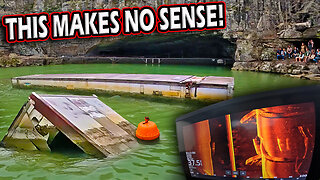 14:55
14:55
Exploring With Nug
12 hours ago $10.67 earnedWe Found Semi Truck Containers While Searching for Missing Man!
50.7K7 -
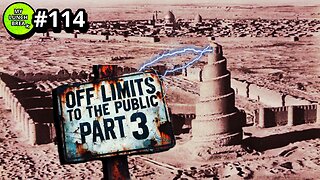 27:57
27:57
MYLUNCHBREAK CHANNEL PAGE
20 hours agoOff Limits to the Public - Pt 3
108K62 -
 38:07
38:07
Michael Franzese
12 hours agoLeaving Organized Crime and Uncovering Mob in Politics: Tudor Dixon and Michael Franzese
97K15 -
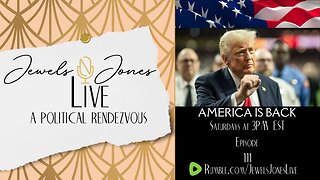 2:42:54
2:42:54
Jewels Jones Live ®
2 days agoAMERICA IS BACK | A Political Rendezvous - Ep. 111
76.9K48 -
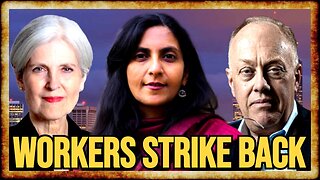 8:47:33
8:47:33
Due Dissidence
1 day agoLIVE: Workers Strike Back Conference ft. Chris Hedges, Jill Stein, Kshama Sawant, and More!
116K57 -
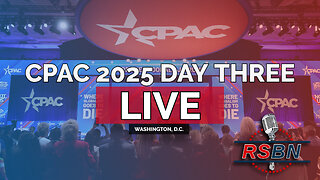 8:36:37
8:36:37
Right Side Broadcasting Network
5 days agoLIVE REPLAY: CPAC 2025 Day Three with President Donald J. Trump - 2/22/25
455K101 -
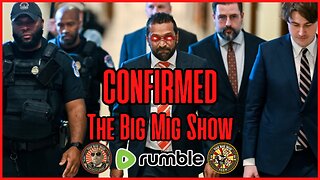 1:05:34
1:05:34
The Big Mig™
20 hours agoConfirmed Kash Patel New FBI Director, Bring On The Pain |EP483
108K31 -
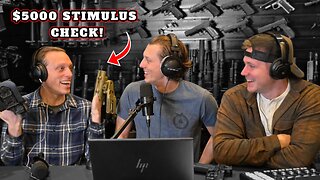 53:59
53:59
Tactical Advisor
16 hours agoThe Vault Room Podcast 009 | Everyone Getting $5000?!
86.8K12 -
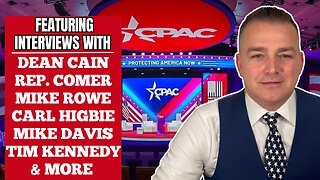 2:04:44
2:04:44
TheAlecLaceShow
1 day agoLive at CPAC | Interviews with Dean Cain, Rep. Comer and more! | The Alec Lace Show
91.1K10 -
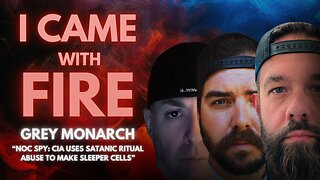 3:12:37
3:12:37
I_Came_With_Fire_Podcast
1 day agoNOC Spy: CIA uses SATANIC RITUAL ABUSE to make SLEEPER Cells
93.8K26